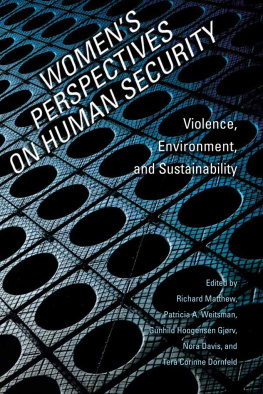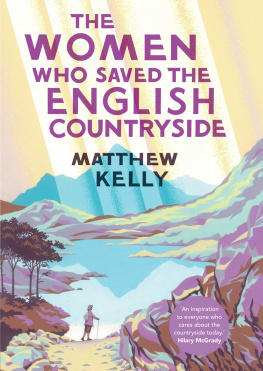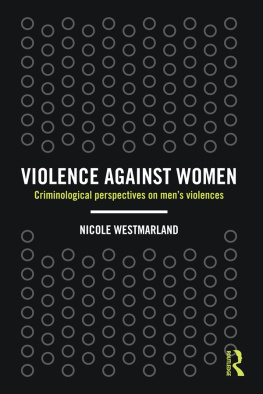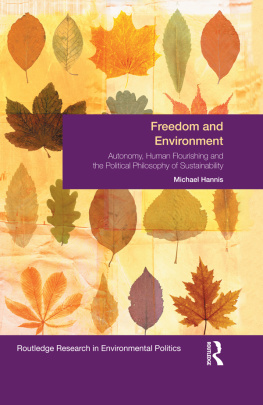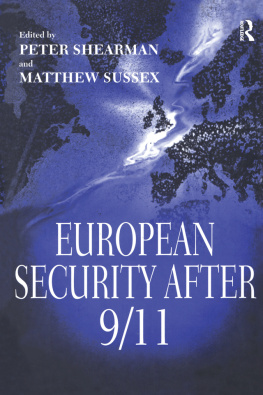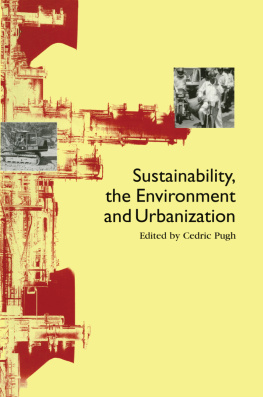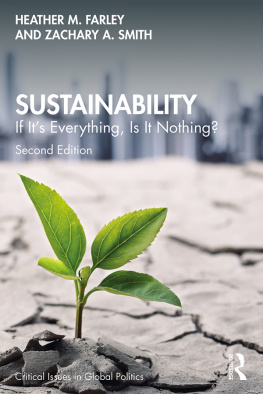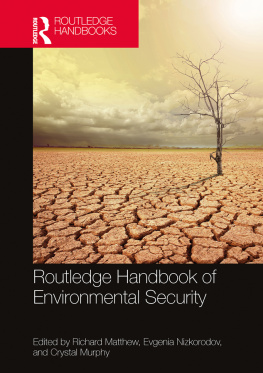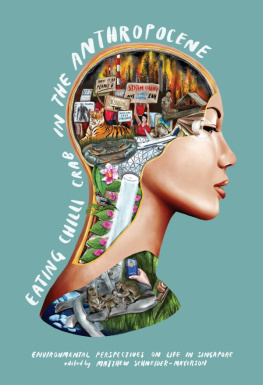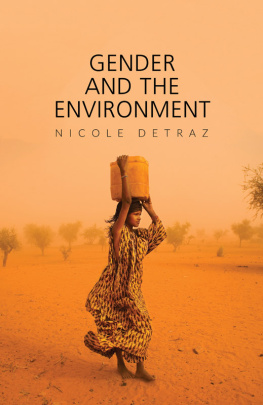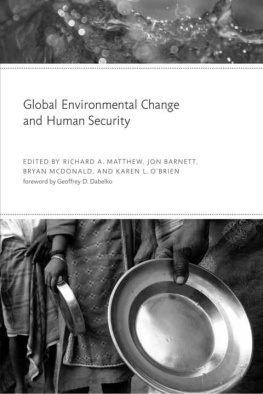Womens Perspectives on Human Security
SERIES IN HUMAN SECURITY
Series editors: Geoffrey Dabelko, Brandon Kendhammer, and Nukhet Sandal
The Series in Human Security is published in association with Ohio Universitys War and Peace Studies and African Studies programs at the Center for International Studies and the Environmental Studies Program at the Voinovich School of Leadership and Public Affairs.
Technologies of Suspicion and the Ethics of Obligation in Political Asylum, edited by Bridget M. Haas and Amy Shuman
Exiting the Fragility Trap: Rethinking Our Approach to the Worlds Most Fragile States, by David Carment and Yiagadeesen Samy
Womens Perspectives on Human Security: Violence, Environment, and Sustainability, edited by Richard A. Matthew, Patricia A. Weitsman, Gunhild Hoogensen Gjrv, Nora Davis, and Tera Dornfeld
Womens Perspectives on Human Security
Violence, Environment, and Sustainability
Edited by
RICHARD A. MATTHEW, PATRICIA A. WEITSMAN, GUNHILD HOOGENSEN GJRV, NORA DAVIS, AND TERA DORNFELD
OHIO UNIVERSITY PRESS
ATHENS
Ohio University Press, Athens, Ohio 45701
ohioswallow.com
2020 by Ohio University Press
All rights reserved
To obtain permission to quote, reprint, or otherwise reproduce or distribute material from Ohio University Press publications, please contact our rights and permissions department at (740) 593-1154 or (740) 593-4536 (fax).
Printed in the United States of America
Ohio University Press books are printed on acid-free paper

30 29 28 27 26 25 24 23 22 21 20 5 4 3 2 1
Library of Congress Cataloging-in-Publication Data
Names: Matthew, Richard A., 1959- editor. | Hoogensen Gjrv, Gunhild, 1966- editor. | Davis, Nora, 1982- editor. | Dornfeld, Tera, 1985- editor. | Weitsman, Patricia A., editor.
Title: Womens perspectives on human security : violence, environment, and sustainability / edited by Richard A. Matthew, Gunhild Hoogensen Gjrv, Nora Davis, Tera Dornfeld, and Patricia A. Weitsman.
Description: Athens : Ohio University Press, 2020. | Series: Series in human security | Includes bibliographical references and index.
Identifiers: LCCN 2020027057 (print) | LCCN 2020027058 (ebook) | ISBN 9780821424278 (hardcover) | ISBN 9780821446997 (pdf)
Subjects: LCSH: Women and human security. | Women--Violence against--Prevention. | Women and the environment. | Women and peace. | Women in war.
Classification: LCC JZ5578 .W6696 2020 (print) | LCC JZ5578 (ebook) | DDC 303.6082--dc23
LC record available at https://lccn.loc.gov/2020027057
LC ebook record available at https://lccn.loc.gov/2020027058
Contents
Gunhild Hoogensen Gjrv, Richard A. Matthew, Tera Dornfeld, and Patricia A. Weitsman
Patricia A. Weitsman
Rachel Stohl
Mia Bloom
Joana Cook
Gunhild Hoogensen Gjrv
Holly Dunn
Vandana Asthana
Tera Dornfeld and Nina M. Flores
Martha Adriana Mrquez-Salaices and Manuel ngeles
Elissa McCarter LaBorde
Richard A. Matthew, Gunhild Hoogensen Gjrv, Nora Davis, and Tera Dornfeld
Acknowledgments
This collection is a tribute to a former professor at Ohio University, Dr. Patricia A. Weitsman. Before her passing, Dr. Weitsman was an editor of this collection and the author of the chapter titled Women, War, and Identity: Policies of Mass Rape in Bosnia and Rwanda. She was a leading political scientist and scholar of security studies and international relations theory. To honor her and her work, this entire volume will be dedicated to our dear friend, Patricia.
Chapter 1
Womens Voices
Perspectives on Violence, Environmental Threats, and Human Security
GUNHILD HOOGENSEN GJRV, RICHARD A. MATTHEW, TERA DORNFELD, AND PATRICIA A. WEITSMAN
For much of the twentieth century, the field of international relations (IR) was shaped in large measure by questions about war and peace, stimulated or amplified by the experience of World War I and World War II. The field developed largely within the English-speaking world, and an Anglo-American perspective came to dominate understandings of IR globally. During the Cold War, as the field grew rapidly, a close relationship developed between several IR scholars and the national security practitioner community around the shared aspiration of developing strategies that would make a third world war unlikely but also winnable should deterrence fail. An enormous amount of research focused on war and peace at three levels of analysisindividual, state, and systeman approach advocated by Kenneth Waltz in his highly influential study Man, the State and War. Even as the field expanded to encompass important areas such as trade
Other perspectivesliberal, Marxist, criticalincrementally created space within the discipline to provide alternative approaches to thinking about IR that wereand continue to beincreasingly embraced. The conversations among these schools of thought has become the core of many IR textbooks and survey courses. From these ongoing conversations, a set of preponderant (but not uncontested) prescriptions have emerged: prevent war, build peace, encourage trade and development, promote human rights, protect the environment, preserve sovereignty, and invest in international institutions.
While the familiar debates among realists, liberals, Marxists, and critical theorists of multiple persuasions have been fruitful and insightful, the field of IR has been simultaneously disrupted and challenged by scholars who have focused on ideas, practices, and values largely excluded from mainstream IR. Mainstream prescriptions, rooted in an Anglo-American worldview, have been revised, interrogated, and challenged by critical feminist, ecological, postcolonial, and militarist perspectives questioning the dominance of neoliberal structures and priorities. Although echoes of these disruptive discourses can be found in any period of human history, and they appeared in compelling and influential forms in the 1970s even as the Cold War seemed a virtually permanent condition, they began to gather considerable support and momentum only after the Cold War had come to a muddled conclusion. Throughout the 1990s, as the international system experienced dramatic transformations, a theoretical turbulence emerged in the field. Latent and critical voices that were previously forced to the margins took advantage of the opportunity the end of the Cold War provided to rethink security and other topics and to disrupt the theoretical landscape of IR.
Prominent among these disruptive discourses are feminism, postcolonialism, environmentalism, and human security. They have often been considered in straightforward terms of the particular issues and insights they bring into IR. For example, an environmental perspective has been integrated into mainstream IR themes, yielding a revised set of themes: sustainable development, environmental security, environmental rights, and so on. Such revised themes are critical elements in global environmental politics, a subfield of IR. These couplings are very productive for both theory building and policy impact. We believe the field of IR has been enriched in this way, and much remains to be achieved by continuing this work. Increasingly, however, scholars are noting and embracing the importance of intersectionality in their analyses, where, for instance, a strictly environmental lens provides an incomplete picture and needs to be expanded through discourses of gender, race, ethnicity, orientation, age, and religion that expose power dynamics and inequalities related to the environment that otherwise might remain unnoticed.

